Entrepreneurial Motivation: Philip Green's Success Factors Report
VerifiedAdded on 2023/01/11
|10
|2563
|20
Report
AI Summary
This report provides an in-depth analysis of entrepreneurial motivation, using Philip Green, CEO of the Arcadia Group, as a case study. It begins by exploring the factors that influenced Green's entrepreneurial journey, including his family background, resilience, passion, and risk-taking abilities. The report then critically evaluates these factors through psychological, sociological, and economic perspectives, examining how traits like openness, conscientiousness, extraversion, agreeableness, and neuroticism contribute to entrepreneurial success. It also analyzes how sociological aspects such as discipline and corporate social responsibility, along with economic principles of profit generation and opportunity recognition, have shaped Green's approach. The report further discusses practical applications, including skills for professional practice like honesty, empathy, and innovation, and concludes by summarizing the key drivers of entrepreneurial success, such as communication skills, confidence, and the ability to identify and capitalize on opportunities. This report offers valuable insights for students seeking to understand the complexities of entrepreneurial motivation and the factors that contribute to business development.

ENTREPRENURIAL
MOTIVATION
MOTIVATION
Paraphrase This Document
Need a fresh take? Get an instant paraphrase of this document with our AI Paraphraser

Contents
INTRODUCTION...........................................................................................................................1
RESEARCH INFORMED LITERATURE.....................................................................................1
KNOWLEDGE AND UNDERSTANDING...................................................................................2
ANALYSIS......................................................................................................................................3
PRACTICAL APPLICATION AND DEPLOYMENT..................................................................3
CONCLUSION................................................................................................................................5
REFERENCES................................................................................................................................7
INTRODUCTION...........................................................................................................................1
RESEARCH INFORMED LITERATURE.....................................................................................1
KNOWLEDGE AND UNDERSTANDING...................................................................................2
ANALYSIS......................................................................................................................................3
PRACTICAL APPLICATION AND DEPLOYMENT..................................................................3
CONCLUSION................................................................................................................................5
REFERENCES................................................................................................................................7
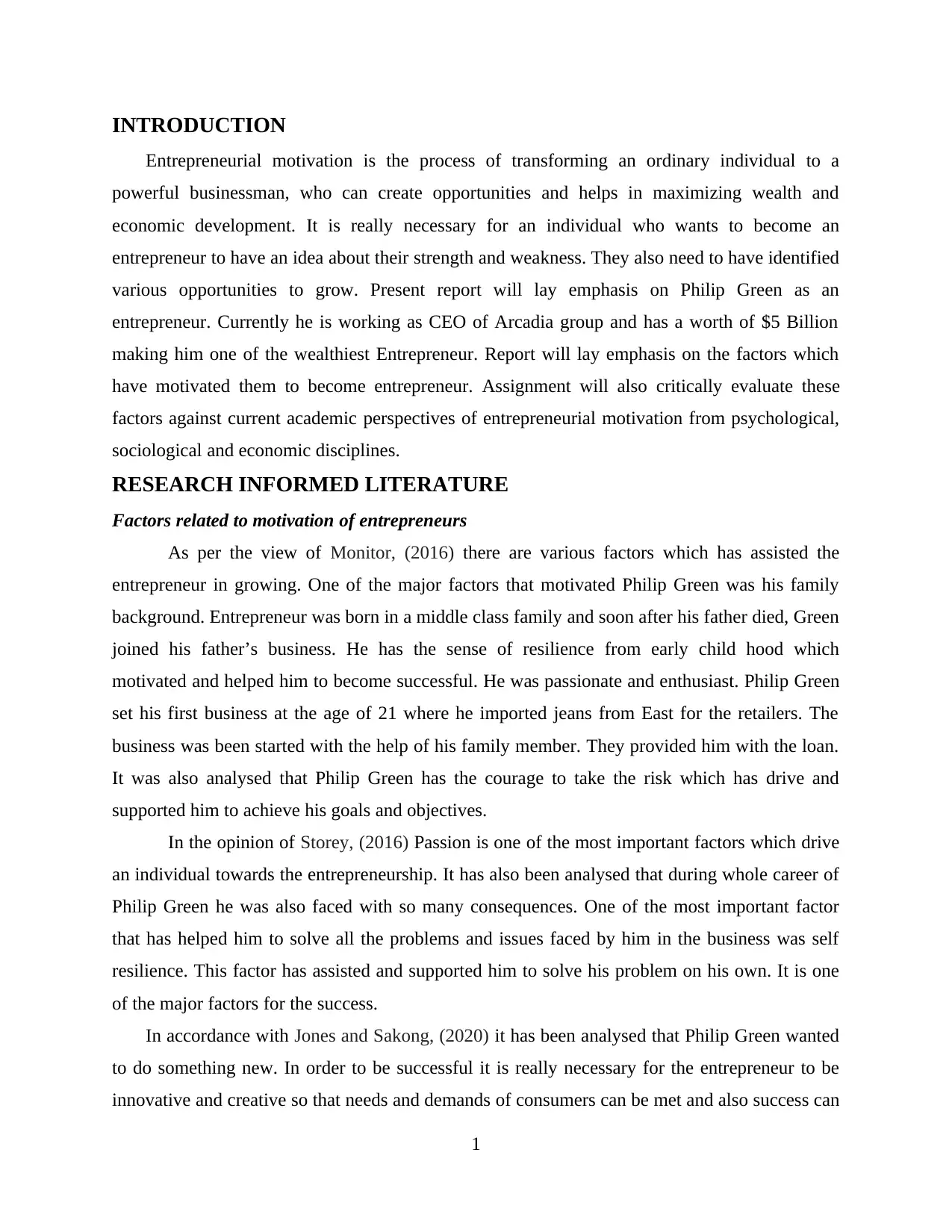
INTRODUCTION
Entrepreneurial motivation is the process of transforming an ordinary individual to a
powerful businessman, who can create opportunities and helps in maximizing wealth and
economic development. It is really necessary for an individual who wants to become an
entrepreneur to have an idea about their strength and weakness. They also need to have identified
various opportunities to grow. Present report will lay emphasis on Philip Green as an
entrepreneur. Currently he is working as CEO of Arcadia group and has a worth of $5 Billion
making him one of the wealthiest Entrepreneur. Report will lay emphasis on the factors which
have motivated them to become entrepreneur. Assignment will also critically evaluate these
factors against current academic perspectives of entrepreneurial motivation from psychological,
sociological and economic disciplines.
RESEARCH INFORMED LITERATURE
Factors related to motivation of entrepreneurs
As per the view of Monitor, (2016) there are various factors which has assisted the
entrepreneur in growing. One of the major factors that motivated Philip Green was his family
background. Entrepreneur was born in a middle class family and soon after his father died, Green
joined his father’s business. He has the sense of resilience from early child hood which
motivated and helped him to become successful. He was passionate and enthusiast. Philip Green
set his first business at the age of 21 where he imported jeans from East for the retailers. The
business was been started with the help of his family member. They provided him with the loan.
It was also analysed that Philip Green has the courage to take the risk which has drive and
supported him to achieve his goals and objectives.
In the opinion of Storey, (2016) Passion is one of the most important factors which drive
an individual towards the entrepreneurship. It has also been analysed that during whole career of
Philip Green he was also faced with so many consequences. One of the most important factor
that has helped him to solve all the problems and issues faced by him in the business was self
resilience. This factor has assisted and supported him to solve his problem on his own. It is one
of the major factors for the success.
In accordance with Jones and Sakong, (2020) it has been analysed that Philip Green wanted
to do something new. In order to be successful it is really necessary for the entrepreneur to be
innovative and creative so that needs and demands of consumers can be met and also success can
1
Entrepreneurial motivation is the process of transforming an ordinary individual to a
powerful businessman, who can create opportunities and helps in maximizing wealth and
economic development. It is really necessary for an individual who wants to become an
entrepreneur to have an idea about their strength and weakness. They also need to have identified
various opportunities to grow. Present report will lay emphasis on Philip Green as an
entrepreneur. Currently he is working as CEO of Arcadia group and has a worth of $5 Billion
making him one of the wealthiest Entrepreneur. Report will lay emphasis on the factors which
have motivated them to become entrepreneur. Assignment will also critically evaluate these
factors against current academic perspectives of entrepreneurial motivation from psychological,
sociological and economic disciplines.
RESEARCH INFORMED LITERATURE
Factors related to motivation of entrepreneurs
As per the view of Monitor, (2016) there are various factors which has assisted the
entrepreneur in growing. One of the major factors that motivated Philip Green was his family
background. Entrepreneur was born in a middle class family and soon after his father died, Green
joined his father’s business. He has the sense of resilience from early child hood which
motivated and helped him to become successful. He was passionate and enthusiast. Philip Green
set his first business at the age of 21 where he imported jeans from East for the retailers. The
business was been started with the help of his family member. They provided him with the loan.
It was also analysed that Philip Green has the courage to take the risk which has drive and
supported him to achieve his goals and objectives.
In the opinion of Storey, (2016) Passion is one of the most important factors which drive
an individual towards the entrepreneurship. It has also been analysed that during whole career of
Philip Green he was also faced with so many consequences. One of the most important factor
that has helped him to solve all the problems and issues faced by him in the business was self
resilience. This factor has assisted and supported him to solve his problem on his own. It is one
of the major factors for the success.
In accordance with Jones and Sakong, (2020) it has been analysed that Philip Green wanted
to do something new. In order to be successful it is really necessary for the entrepreneur to be
innovative and creative so that needs and demands of consumers can be met and also success can
1
⊘ This is a preview!⊘
Do you want full access?
Subscribe today to unlock all pages.

Trusted by 1+ million students worldwide
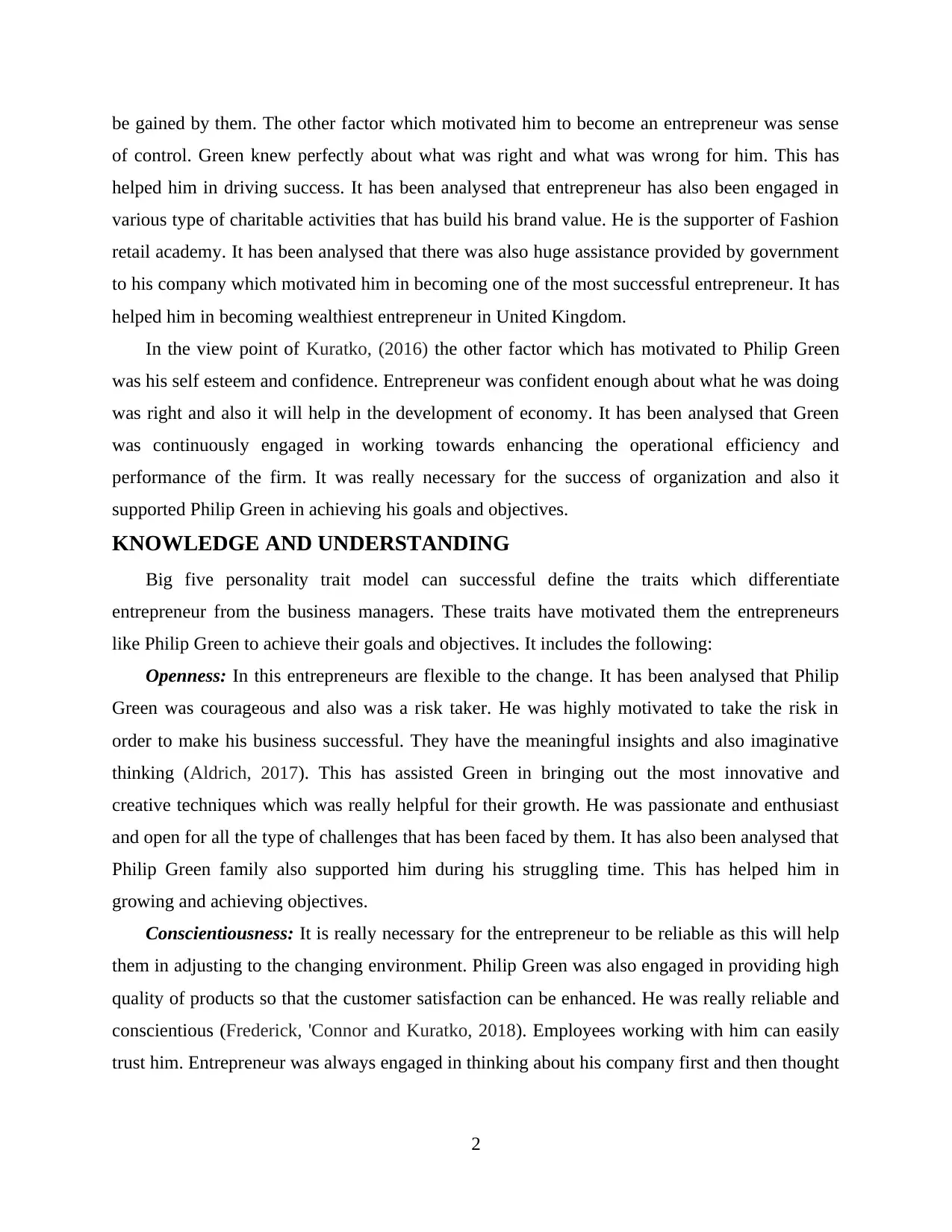
be gained by them. The other factor which motivated him to become an entrepreneur was sense
of control. Green knew perfectly about what was right and what was wrong for him. This has
helped him in driving success. It has been analysed that entrepreneur has also been engaged in
various type of charitable activities that has build his brand value. He is the supporter of Fashion
retail academy. It has been analysed that there was also huge assistance provided by government
to his company which motivated him in becoming one of the most successful entrepreneur. It has
helped him in becoming wealthiest entrepreneur in United Kingdom.
In the view point of Kuratko, (2016) the other factor which has motivated to Philip Green
was his self esteem and confidence. Entrepreneur was confident enough about what he was doing
was right and also it will help in the development of economy. It has been analysed that Green
was continuously engaged in working towards enhancing the operational efficiency and
performance of the firm. It was really necessary for the success of organization and also it
supported Philip Green in achieving his goals and objectives.
KNOWLEDGE AND UNDERSTANDING
Big five personality trait model can successful define the traits which differentiate
entrepreneur from the business managers. These traits have motivated them the entrepreneurs
like Philip Green to achieve their goals and objectives. It includes the following:
Openness: In this entrepreneurs are flexible to the change. It has been analysed that Philip
Green was courageous and also was a risk taker. He was highly motivated to take the risk in
order to make his business successful. They have the meaningful insights and also imaginative
thinking (Aldrich, 2017). This has assisted Green in bringing out the most innovative and
creative techniques which was really helpful for their growth. He was passionate and enthusiast
and open for all the type of challenges that has been faced by them. It has also been analysed that
Philip Green family also supported him during his struggling time. This has helped him in
growing and achieving objectives.
Conscientiousness: It is really necessary for the entrepreneur to be reliable as this will help
them in adjusting to the changing environment. Philip Green was also engaged in providing high
quality of products so that the customer satisfaction can be enhanced. He was really reliable and
conscientious (Frederick, 'Connor and Kuratko, 2018). Employees working with him can easily
trust him. Entrepreneur was always engaged in thinking about his company first and then thought
2
of control. Green knew perfectly about what was right and what was wrong for him. This has
helped him in driving success. It has been analysed that entrepreneur has also been engaged in
various type of charitable activities that has build his brand value. He is the supporter of Fashion
retail academy. It has been analysed that there was also huge assistance provided by government
to his company which motivated him in becoming one of the most successful entrepreneur. It has
helped him in becoming wealthiest entrepreneur in United Kingdom.
In the view point of Kuratko, (2016) the other factor which has motivated to Philip Green
was his self esteem and confidence. Entrepreneur was confident enough about what he was doing
was right and also it will help in the development of economy. It has been analysed that Green
was continuously engaged in working towards enhancing the operational efficiency and
performance of the firm. It was really necessary for the success of organization and also it
supported Philip Green in achieving his goals and objectives.
KNOWLEDGE AND UNDERSTANDING
Big five personality trait model can successful define the traits which differentiate
entrepreneur from the business managers. These traits have motivated them the entrepreneurs
like Philip Green to achieve their goals and objectives. It includes the following:
Openness: In this entrepreneurs are flexible to the change. It has been analysed that Philip
Green was courageous and also was a risk taker. He was highly motivated to take the risk in
order to make his business successful. They have the meaningful insights and also imaginative
thinking (Aldrich, 2017). This has assisted Green in bringing out the most innovative and
creative techniques which was really helpful for their growth. He was passionate and enthusiast
and open for all the type of challenges that has been faced by them. It has also been analysed that
Philip Green family also supported him during his struggling time. This has helped him in
growing and achieving objectives.
Conscientiousness: It is really necessary for the entrepreneur to be reliable as this will help
them in adjusting to the changing environment. Philip Green was also engaged in providing high
quality of products so that the customer satisfaction can be enhanced. He was really reliable and
conscientious (Frederick, 'Connor and Kuratko, 2018). Employees working with him can easily
trust him. Entrepreneur was always engaged in thinking about his company first and then thought
2
Paraphrase This Document
Need a fresh take? Get an instant paraphrase of this document with our AI Paraphraser
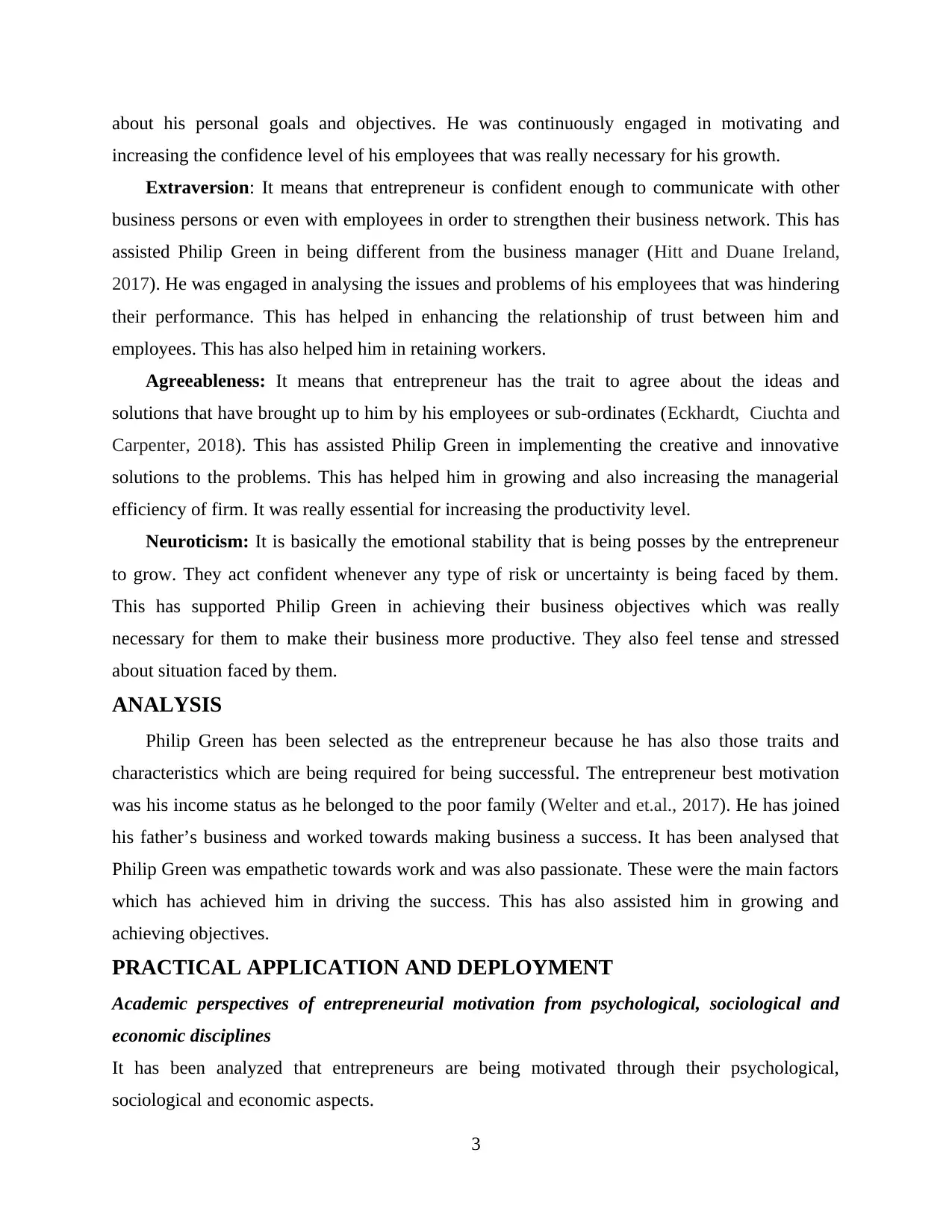
about his personal goals and objectives. He was continuously engaged in motivating and
increasing the confidence level of his employees that was really necessary for his growth.
Extraversion: It means that entrepreneur is confident enough to communicate with other
business persons or even with employees in order to strengthen their business network. This has
assisted Philip Green in being different from the business manager (Hitt and Duane Ireland,
2017). He was engaged in analysing the issues and problems of his employees that was hindering
their performance. This has helped in enhancing the relationship of trust between him and
employees. This has also helped him in retaining workers.
Agreeableness: It means that entrepreneur has the trait to agree about the ideas and
solutions that have brought up to him by his employees or sub-ordinates (Eckhardt, Ciuchta and
Carpenter, 2018). This has assisted Philip Green in implementing the creative and innovative
solutions to the problems. This has helped him in growing and also increasing the managerial
efficiency of firm. It was really essential for increasing the productivity level.
Neuroticism: It is basically the emotional stability that is being posses by the entrepreneur
to grow. They act confident whenever any type of risk or uncertainty is being faced by them.
This has supported Philip Green in achieving their business objectives which was really
necessary for them to make their business more productive. They also feel tense and stressed
about situation faced by them.
ANALYSIS
Philip Green has been selected as the entrepreneur because he has also those traits and
characteristics which are being required for being successful. The entrepreneur best motivation
was his income status as he belonged to the poor family (Welter and et.al., 2017). He has joined
his father’s business and worked towards making business a success. It has been analysed that
Philip Green was empathetic towards work and was also passionate. These were the main factors
which has achieved him in driving the success. This has also assisted him in growing and
achieving objectives.
PRACTICAL APPLICATION AND DEPLOYMENT
Academic perspectives of entrepreneurial motivation from psychological, sociological and
economic disciplines
It has been analyzed that entrepreneurs are being motivated through their psychological,
sociological and economic aspects.
3
increasing the confidence level of his employees that was really necessary for his growth.
Extraversion: It means that entrepreneur is confident enough to communicate with other
business persons or even with employees in order to strengthen their business network. This has
assisted Philip Green in being different from the business manager (Hitt and Duane Ireland,
2017). He was engaged in analysing the issues and problems of his employees that was hindering
their performance. This has helped in enhancing the relationship of trust between him and
employees. This has also helped him in retaining workers.
Agreeableness: It means that entrepreneur has the trait to agree about the ideas and
solutions that have brought up to him by his employees or sub-ordinates (Eckhardt, Ciuchta and
Carpenter, 2018). This has assisted Philip Green in implementing the creative and innovative
solutions to the problems. This has helped him in growing and also increasing the managerial
efficiency of firm. It was really essential for increasing the productivity level.
Neuroticism: It is basically the emotional stability that is being posses by the entrepreneur
to grow. They act confident whenever any type of risk or uncertainty is being faced by them.
This has supported Philip Green in achieving their business objectives which was really
necessary for them to make their business more productive. They also feel tense and stressed
about situation faced by them.
ANALYSIS
Philip Green has been selected as the entrepreneur because he has also those traits and
characteristics which are being required for being successful. The entrepreneur best motivation
was his income status as he belonged to the poor family (Welter and et.al., 2017). He has joined
his father’s business and worked towards making business a success. It has been analysed that
Philip Green was empathetic towards work and was also passionate. These were the main factors
which has achieved him in driving the success. This has also assisted him in growing and
achieving objectives.
PRACTICAL APPLICATION AND DEPLOYMENT
Academic perspectives of entrepreneurial motivation from psychological, sociological and
economic disciplines
It has been analyzed that entrepreneurs are being motivated through their psychological,
sociological and economic aspects.
3
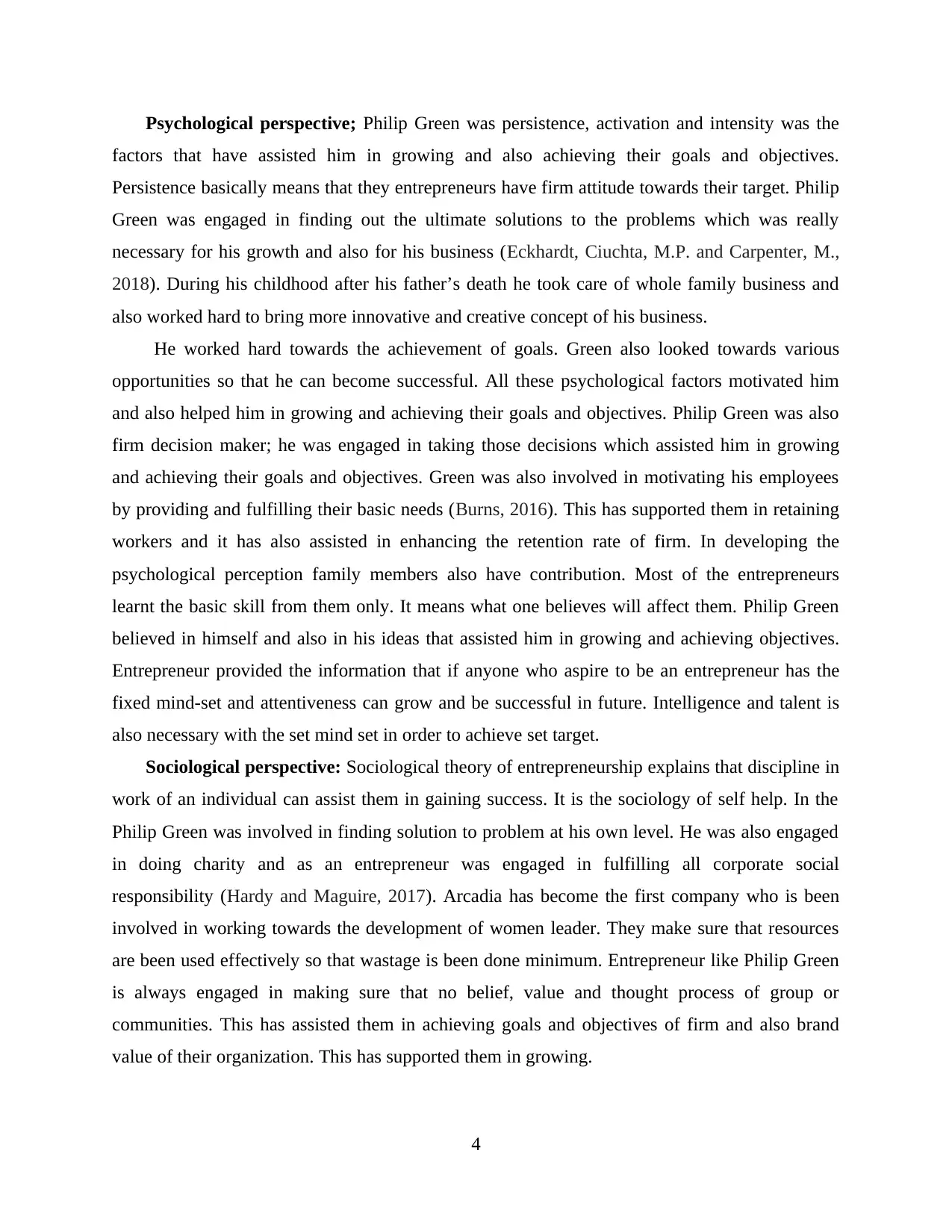
Psychological perspective; Philip Green was persistence, activation and intensity was the
factors that have assisted him in growing and also achieving their goals and objectives.
Persistence basically means that they entrepreneurs have firm attitude towards their target. Philip
Green was engaged in finding out the ultimate solutions to the problems which was really
necessary for his growth and also for his business (Eckhardt, Ciuchta, M.P. and Carpenter, M.,
2018). During his childhood after his father’s death he took care of whole family business and
also worked hard to bring more innovative and creative concept of his business.
He worked hard towards the achievement of goals. Green also looked towards various
opportunities so that he can become successful. All these psychological factors motivated him
and also helped him in growing and achieving their goals and objectives. Philip Green was also
firm decision maker; he was engaged in taking those decisions which assisted him in growing
and achieving their goals and objectives. Green was also involved in motivating his employees
by providing and fulfilling their basic needs (Burns, 2016). This has supported them in retaining
workers and it has also assisted in enhancing the retention rate of firm. In developing the
psychological perception family members also have contribution. Most of the entrepreneurs
learnt the basic skill from them only. It means what one believes will affect them. Philip Green
believed in himself and also in his ideas that assisted him in growing and achieving objectives.
Entrepreneur provided the information that if anyone who aspire to be an entrepreneur has the
fixed mind-set and attentiveness can grow and be successful in future. Intelligence and talent is
also necessary with the set mind set in order to achieve set target.
Sociological perspective: Sociological theory of entrepreneurship explains that discipline in
work of an individual can assist them in gaining success. It is the sociology of self help. In the
Philip Green was involved in finding solution to problem at his own level. He was also engaged
in doing charity and as an entrepreneur was engaged in fulfilling all corporate social
responsibility (Hardy and Maguire, 2017). Arcadia has become the first company who is been
involved in working towards the development of women leader. They make sure that resources
are been used effectively so that wastage is been done minimum. Entrepreneur like Philip Green
is always engaged in making sure that no belief, value and thought process of group or
communities. This has assisted them in achieving goals and objectives of firm and also brand
value of their organization. This has supported them in growing.
4
factors that have assisted him in growing and also achieving their goals and objectives.
Persistence basically means that they entrepreneurs have firm attitude towards their target. Philip
Green was engaged in finding out the ultimate solutions to the problems which was really
necessary for his growth and also for his business (Eckhardt, Ciuchta, M.P. and Carpenter, M.,
2018). During his childhood after his father’s death he took care of whole family business and
also worked hard to bring more innovative and creative concept of his business.
He worked hard towards the achievement of goals. Green also looked towards various
opportunities so that he can become successful. All these psychological factors motivated him
and also helped him in growing and achieving their goals and objectives. Philip Green was also
firm decision maker; he was engaged in taking those decisions which assisted him in growing
and achieving their goals and objectives. Green was also involved in motivating his employees
by providing and fulfilling their basic needs (Burns, 2016). This has supported them in retaining
workers and it has also assisted in enhancing the retention rate of firm. In developing the
psychological perception family members also have contribution. Most of the entrepreneurs
learnt the basic skill from them only. It means what one believes will affect them. Philip Green
believed in himself and also in his ideas that assisted him in growing and achieving objectives.
Entrepreneur provided the information that if anyone who aspire to be an entrepreneur has the
fixed mind-set and attentiveness can grow and be successful in future. Intelligence and talent is
also necessary with the set mind set in order to achieve set target.
Sociological perspective: Sociological theory of entrepreneurship explains that discipline in
work of an individual can assist them in gaining success. It is the sociology of self help. In the
Philip Green was involved in finding solution to problem at his own level. He was also engaged
in doing charity and as an entrepreneur was engaged in fulfilling all corporate social
responsibility (Hardy and Maguire, 2017). Arcadia has become the first company who is been
involved in working towards the development of women leader. They make sure that resources
are been used effectively so that wastage is been done minimum. Entrepreneur like Philip Green
is always engaged in making sure that no belief, value and thought process of group or
communities. This has assisted them in achieving goals and objectives of firm and also brand
value of their organization. This has supported them in growing.
4
⊘ This is a preview!⊘
Do you want full access?
Subscribe today to unlock all pages.

Trusted by 1+ million students worldwide
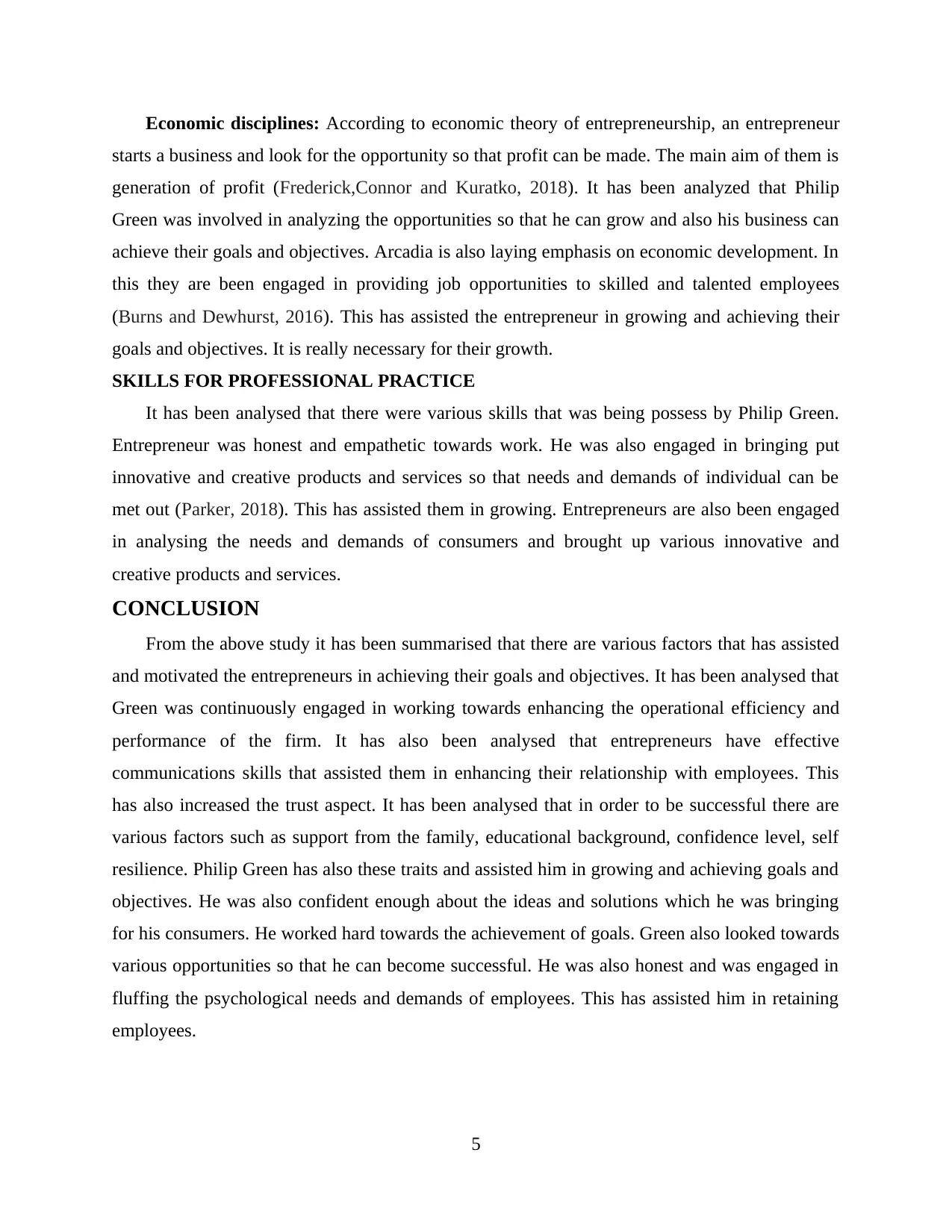
Economic disciplines: According to economic theory of entrepreneurship, an entrepreneur
starts a business and look for the opportunity so that profit can be made. The main aim of them is
generation of profit (Frederick,Connor and Kuratko, 2018). It has been analyzed that Philip
Green was involved in analyzing the opportunities so that he can grow and also his business can
achieve their goals and objectives. Arcadia is also laying emphasis on economic development. In
this they are been engaged in providing job opportunities to skilled and talented employees
(Burns and Dewhurst, 2016). This has assisted the entrepreneur in growing and achieving their
goals and objectives. It is really necessary for their growth.
SKILLS FOR PROFESSIONAL PRACTICE
It has been analysed that there were various skills that was being possess by Philip Green.
Entrepreneur was honest and empathetic towards work. He was also engaged in bringing put
innovative and creative products and services so that needs and demands of individual can be
met out (Parker, 2018). This has assisted them in growing. Entrepreneurs are also been engaged
in analysing the needs and demands of consumers and brought up various innovative and
creative products and services.
CONCLUSION
From the above study it has been summarised that there are various factors that has assisted
and motivated the entrepreneurs in achieving their goals and objectives. It has been analysed that
Green was continuously engaged in working towards enhancing the operational efficiency and
performance of the firm. It has also been analysed that entrepreneurs have effective
communications skills that assisted them in enhancing their relationship with employees. This
has also increased the trust aspect. It has been analysed that in order to be successful there are
various factors such as support from the family, educational background, confidence level, self
resilience. Philip Green has also these traits and assisted him in growing and achieving goals and
objectives. He was also confident enough about the ideas and solutions which he was bringing
for his consumers. He worked hard towards the achievement of goals. Green also looked towards
various opportunities so that he can become successful. He was also honest and was engaged in
fluffing the psychological needs and demands of employees. This has assisted him in retaining
employees.
5
starts a business and look for the opportunity so that profit can be made. The main aim of them is
generation of profit (Frederick,Connor and Kuratko, 2018). It has been analyzed that Philip
Green was involved in analyzing the opportunities so that he can grow and also his business can
achieve their goals and objectives. Arcadia is also laying emphasis on economic development. In
this they are been engaged in providing job opportunities to skilled and talented employees
(Burns and Dewhurst, 2016). This has assisted the entrepreneur in growing and achieving their
goals and objectives. It is really necessary for their growth.
SKILLS FOR PROFESSIONAL PRACTICE
It has been analysed that there were various skills that was being possess by Philip Green.
Entrepreneur was honest and empathetic towards work. He was also engaged in bringing put
innovative and creative products and services so that needs and demands of individual can be
met out (Parker, 2018). This has assisted them in growing. Entrepreneurs are also been engaged
in analysing the needs and demands of consumers and brought up various innovative and
creative products and services.
CONCLUSION
From the above study it has been summarised that there are various factors that has assisted
and motivated the entrepreneurs in achieving their goals and objectives. It has been analysed that
Green was continuously engaged in working towards enhancing the operational efficiency and
performance of the firm. It has also been analysed that entrepreneurs have effective
communications skills that assisted them in enhancing their relationship with employees. This
has also increased the trust aspect. It has been analysed that in order to be successful there are
various factors such as support from the family, educational background, confidence level, self
resilience. Philip Green has also these traits and assisted him in growing and achieving goals and
objectives. He was also confident enough about the ideas and solutions which he was bringing
for his consumers. He worked hard towards the achievement of goals. Green also looked towards
various opportunities so that he can become successful. He was also honest and was engaged in
fluffing the psychological needs and demands of employees. This has assisted him in retaining
employees.
5
Paraphrase This Document
Need a fresh take? Get an instant paraphrase of this document with our AI Paraphraser

6
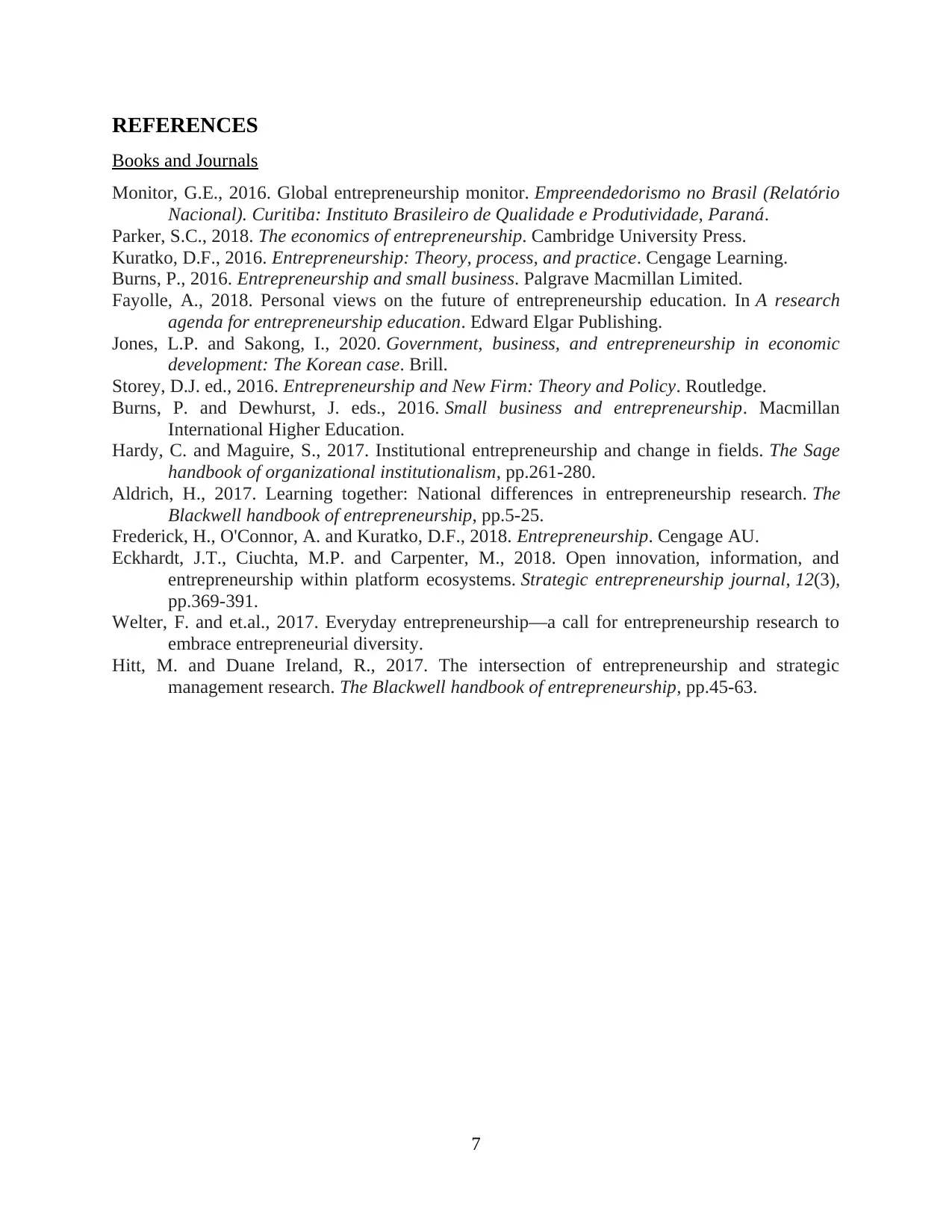
REFERENCES
Books and Journals
Monitor, G.E., 2016. Global entrepreneurship monitor. Empreendedorismo no Brasil (Relatório
Nacional). Curitiba: Instituto Brasileiro de Qualidade e Produtividade, Paraná.
Parker, S.C., 2018. The economics of entrepreneurship. Cambridge University Press.
Kuratko, D.F., 2016. Entrepreneurship: Theory, process, and practice. Cengage Learning.
Burns, P., 2016. Entrepreneurship and small business. Palgrave Macmillan Limited.
Fayolle, A., 2018. Personal views on the future of entrepreneurship education. In A research
agenda for entrepreneurship education. Edward Elgar Publishing.
Jones, L.P. and Sakong, I., 2020. Government, business, and entrepreneurship in economic
development: The Korean case. Brill.
Storey, D.J. ed., 2016. Entrepreneurship and New Firm: Theory and Policy. Routledge.
Burns, P. and Dewhurst, J. eds., 2016. Small business and entrepreneurship. Macmillan
International Higher Education.
Hardy, C. and Maguire, S., 2017. Institutional entrepreneurship and change in fields. The Sage
handbook of organizational institutionalism, pp.261-280.
Aldrich, H., 2017. Learning together: National differences in entrepreneurship research. The
Blackwell handbook of entrepreneurship, pp.5-25.
Frederick, H., O'Connor, A. and Kuratko, D.F., 2018. Entrepreneurship. Cengage AU.
Eckhardt, J.T., Ciuchta, M.P. and Carpenter, M., 2018. Open innovation, information, and
entrepreneurship within platform ecosystems. Strategic entrepreneurship journal, 12(3),
pp.369-391.
Welter, F. and et.al., 2017. Everyday entrepreneurship—a call for entrepreneurship research to
embrace entrepreneurial diversity.
Hitt, M. and Duane Ireland, R., 2017. The intersection of entrepreneurship and strategic
management research. The Blackwell handbook of entrepreneurship, pp.45-63.
7
Books and Journals
Monitor, G.E., 2016. Global entrepreneurship monitor. Empreendedorismo no Brasil (Relatório
Nacional). Curitiba: Instituto Brasileiro de Qualidade e Produtividade, Paraná.
Parker, S.C., 2018. The economics of entrepreneurship. Cambridge University Press.
Kuratko, D.F., 2016. Entrepreneurship: Theory, process, and practice. Cengage Learning.
Burns, P., 2016. Entrepreneurship and small business. Palgrave Macmillan Limited.
Fayolle, A., 2018. Personal views on the future of entrepreneurship education. In A research
agenda for entrepreneurship education. Edward Elgar Publishing.
Jones, L.P. and Sakong, I., 2020. Government, business, and entrepreneurship in economic
development: The Korean case. Brill.
Storey, D.J. ed., 2016. Entrepreneurship and New Firm: Theory and Policy. Routledge.
Burns, P. and Dewhurst, J. eds., 2016. Small business and entrepreneurship. Macmillan
International Higher Education.
Hardy, C. and Maguire, S., 2017. Institutional entrepreneurship and change in fields. The Sage
handbook of organizational institutionalism, pp.261-280.
Aldrich, H., 2017. Learning together: National differences in entrepreneurship research. The
Blackwell handbook of entrepreneurship, pp.5-25.
Frederick, H., O'Connor, A. and Kuratko, D.F., 2018. Entrepreneurship. Cengage AU.
Eckhardt, J.T., Ciuchta, M.P. and Carpenter, M., 2018. Open innovation, information, and
entrepreneurship within platform ecosystems. Strategic entrepreneurship journal, 12(3),
pp.369-391.
Welter, F. and et.al., 2017. Everyday entrepreneurship—a call for entrepreneurship research to
embrace entrepreneurial diversity.
Hitt, M. and Duane Ireland, R., 2017. The intersection of entrepreneurship and strategic
management research. The Blackwell handbook of entrepreneurship, pp.45-63.
7
⊘ This is a preview!⊘
Do you want full access?
Subscribe today to unlock all pages.

Trusted by 1+ million students worldwide

8
1 out of 10
Related Documents
Your All-in-One AI-Powered Toolkit for Academic Success.
+13062052269
info@desklib.com
Available 24*7 on WhatsApp / Email
![[object Object]](/_next/static/media/star-bottom.7253800d.svg)
Unlock your academic potential
Copyright © 2020–2026 A2Z Services. All Rights Reserved. Developed and managed by ZUCOL.





